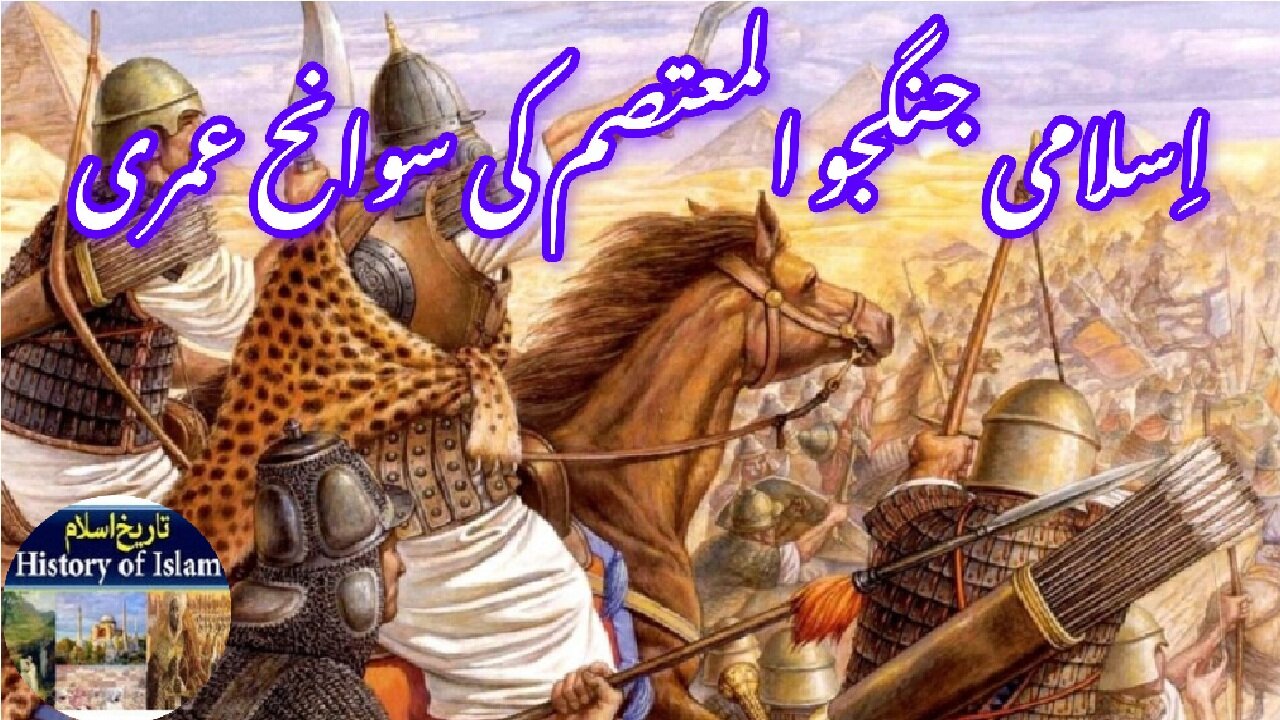Premium Only Content

Biography of Islamic Warrior Leader Al-Mutasim | اسلامی جنگجو رہبر المتصم کی سوانح عمری
@islamichistory813 #Biography #IslamicWarrior #Leadership #Al-Mutasim
Biography of Islamic Warrior Leader Al-Mutasim
Dekhti Aankhooon aur sountay kaanoon ko Asslamoalaikum, sisters, brothers friends and elders,In this islamic informative video, we are presenting the biography of Al-Mutasim, an influential Islamic warrior leader whose reign marked significant military advancements and cultural developments. Through detailed analysis, we highlight his key battles, leadership qualities, and the enduring influence he left on subsequent generations. Watch complete video and get to know the story of Al-Mutasim and his vital role in the expansion of the Islamic empire.
Abu Ishaq Muhammad ibn Harun al-Mutasim was the eighth Abbasid caliph, ruling from 833 until his death in 842. A younger son of Caliph Harun al-Rashid, he rose to prominence through his formation of a private army composed predominantly of Turkic slave-soldiers (ghilman, sing. ghulam). This proved useful to his half-brother, Caliph al-Ma'mun, who employed al-Mu'tasim and his Turkish guard to counterbalance other powerful interest groups in the state, as well as employing them in campaigns against rebels and the Byzantine Empire. When al-Ma'mun died unexpectedly on campaign in August 833, al-Mu'tasim was thus well placed to succeed him, overriding the claims of al-Ma'mun's son al-Abbas.
Al-Mu'tasim continued many of his brother's policies, such as the partnership with the Tahirids, who governed Khurasan and Baghdad on behalf of the Abbasids. With the support of the powerful chief qadi, Ahmad ibn Abi Duwad, he continued to implement the rationalist Islamic doctrine of Mu'tazilism and the persecution of its opponents through the inquisition (mi?na). Although not personally interested in literary pursuits, al-Mu'tasim also nurtured the scientific renaissance begun under al-Ma'mun. In other ways, his reign marks a departure and a watershed moment in Islamic history, with the creation of a new regime centred on the military, and particularly his Turkish guard. In 836, a new capital was established at Samarra to symbolize this new regime and remove it from the restive populace of Baghdad. The power of the caliphal government was increased by centralizing measures that reduced the power of provincial governors in favour of a small group of senior civil and military officials in Samarra, and the fiscal apparatus of the state was more and more dedicated to the maintenance of the professional army, which was dominated by Turks. The Arab and Iranian elites that had played a major role in the early period of the Abbasid state were increasingly marginalized, and an abortive conspiracy against al-Mu'tasim in favour of al-Abbas in 838 resulted in a widespread purge of their ranks. This strengthened the position of the Turks and their principal leaders, Ashinas, Wasif, Itakh, and Bugha. Another prominent member of al-Mu'tasim's inner circle, the prince of Ushrusana, al-Afshin, fell afoul of his enemies at court and was overthrown and killed in 840/1. The rise of the Turks would eventually result in the troubles of the 'Anarchy at Samarra' and lead to the collapse of Abbasid power in the mid-10th century, but the ghul?m-based system inaugurated by al-Mu'tasim would be widely adopted throughout the Muslim world.
Al-Mu'tasim's reign was marked by continuous warfare. The two major internal campaigns of the reign were against the long-running Khurramite uprising of Babak Khorramdin in Adharbayjan, which was suppressed by al-Afshin in 835–837, and against Mazyar, the autonomous ruler of Tabaristan, who had clashed with the Tahirid governor of Khorasan and risen up in revolt. While his generals led the fight against internal rebellions, al-Mu'tasim himself led the sole major external campaign of the period, in 838 against the Byzantine Empire. His armies defeated Emperor Theophilos and sacked the city of Amorium. The Amorium campaign was widely celebrated, and became a cornerstone of caliphal propaganda, cementing al-Mu'tasim's reputation as a warrior-caliph.
Muhammad, the future al-Mu'tasim, was born in the Khuld ("Eternity") Palace in Baghdad, but the exact date is unclear: according to the historian al-Tabari (839–923), his birth was placed by authorities either in Sha'ban AH 180 (October 796 CE), or in AH 179 (Spring 796 CE or earlier). His parents were the fifth Abbasid caliph, Harun al-Rashid, and Marida bint Shabib, a slave concubine. Marida was born in Kufa, but her family hailed from Soghdia, and she is usually considered to have been of Turkic origin.
The young prince's early life coincided with what, in the judgment of posterity, was the golden age of the Abbasid Caliphate. The abrupt downfall of the powerful Barmakid family, which had dominated government during the previous decades, in 803 hinted at political instability at the highest levels of the court, while provincial rebellions that were suppressed with difficulty provided warning signals about the dynasty's hold over the empire. Nevertheless, compared to the strife and division that followed in the decades after Harun's death, the Abbasid empire was living through its halcyon days. Harun still ruled directly over the bulk of the Islamic world of his time, from Central Asia and Sind in the east to the Maghreb in the west. Lively trade networks linking Tang China and the Indian Ocean with Europe and Africa passed through the caliphate, with Baghdad at their nexus, bringing immense prosperity. The revenues of the provinces kept the treasury full, allowing Harun to launch huge expeditions against the Byzantine Empire and engage in vigorous diplomacy, his envoys arriving even at the distant court of Charlemagne. This wealth also allowed considerable patronage: charitable endowments to the Muslim holy cities of Mecca and Medina and the welcoming of religious scholars and ascetics at court secured the benevolence of the religious classes towards the dynasty, while the funds lavished on poets guaranteed its lasting fame; the splendour of the caliphal court provided the inspiration for some of the earliest stories of the One Thousand and One Nights.
Tomorow we will be described How was Career of Al-Mutasim under al-Ma'mun. So permission us upto tomorow. Allah Hafiz
========================
-
 1:59
1:59
ISLAMIC HISTORY
1 day agoSurah At Taubah Verse No 16 تلاوت َسورة اَلتَّوْبَة اردو اور انگریزی ترجمے کے ساتھ آیت نمبر
121 -
 9:43
9:43
MattMorseTV
3 hours ago $0.32 earnedTulsi just DROPPED a BOMBSHELL.
4922 -
 58:41
58:41
BonginoReport
8 hours agoTrump Impersonations & Friday Fun w/ Shawn Farash - Nightly Scroll w/ Hayley Caronia (Ep.93)
65.7K17 -
 LIVE
LIVE
The Mike Schwartz Show
8 hours agoTHE MIKE SCHWARTZ SHOW Evening Edition 07-18-2025 with guest Congressman Buddy Carter!
4,216 watching -
 LIVE
LIVE
FusedAegisTV
4 hours agoRumble Smackdown! #004 Tekken 8 $100+ Online Tournament !bracket !prizepool
94 watching -

Sarah Westall
1 hour agoPlanning is Over, War has Started: First Stage of Economic Global War: Commodities w/ Andy Schectman
3.88K -
 LIVE
LIVE
BSparksGaming
11 hours agoDonkey Kong BONANZA Walkthrough Gameplay! (Part 2)
138 watching -
 LIVE
LIVE
LFA TV
21 hours agoLFA TV ALL DAY STREAM - FRIDAY 7/18/25
600 watching -
 LIVE
LIVE
SilverFox
5 hours ago🔴LIVE - Fortnite - Maybe ABI Later + FoxChat DOUBLE XP
90 watching -
 1:21:58
1:21:58
Kim Iversen
7 hours ago"There Is No Death": What This Man Saw Outside His Body Will Blow Your Mind
84.3K60